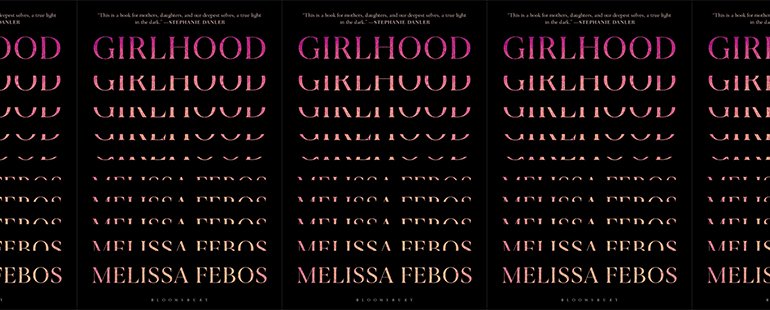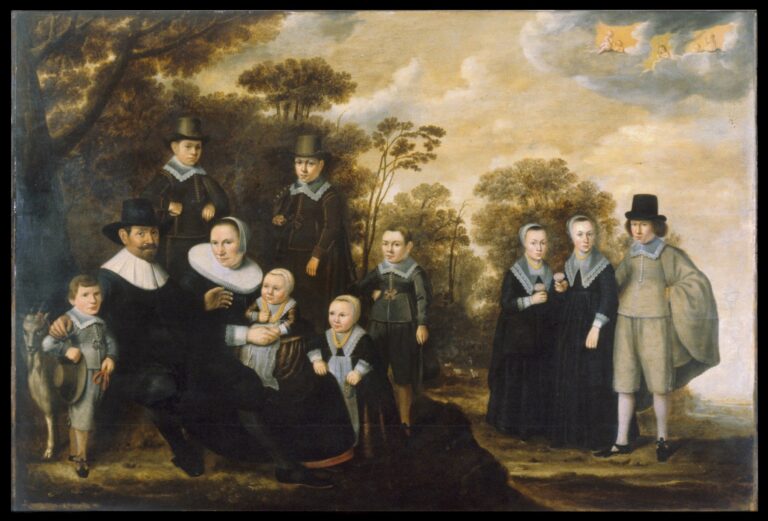“Girlhood is a much darker, more complex—more amazing—experience than what that association suggests”: An Interview with Melissa Febos

“Sometimes I think about going back,” Melissa Febos writes in “Wild America,” an essay from her third book, Girlhood, out tomorrow. “I imagine reversing the film of my personhood, reeling the spool to find the single frame where it all changes. As though there would be one murky celluloid square in which my body was taken away from me.” She goes on to acknowledge that “There wouldn’t be just one frame, of course. It was so many things.” Girlhood examines the time when a girl’s body is taken from her, which, for Febos, began before age twelve. Febos learned in her interactions with other girls that a girl’s body becoming a woman’s “was a race that [she] had won without trying, and to win it was the greatest loss of all.” The fierce, muscular, springy body she had relied on and took pride in was lost. “My body, that once reliable vessel, began to transform,” she says. “But what emerged from it was no happy magic, no abracadabra. It went kaboom. The new body was harder to disappear.” Suddenly, she had become visible to her peers and to men in a way she hadn’t been before.
The essays of Girlhood read less like a coming-of-age story than they do like a manifesto of all the ways girlhood takes a toll on a girl’s life, as well as of the cultural experience of being a woman. Febos lays bare how girls judge each other and how men objectify them. Men gaze at their developing bodies or, worse, feel entitled to do more than gaze. “How different is a gaze from a hand, after all?” Febos asks in “Intrusions,” an essay about the peeping Tom who whispers obscenities through her window. She continues, “What a powerful message it is, that your body ought to be available to any man passing by. It will only inconvenience you to protest. Better to tolerate it. Reframe it as nothing memorable, as a joke, as journalism, as privilege, even as precursor to love.” Since they were girls, women have learned to find ways to brush off the behavior of men, to find a way to make men’s behavior palatable so that they are palatable—something women wouldn’t be if they rebuffed their harassers’ behavior.
Febos’s writing shocks and stings: her essays—rife with research, interviews, and other sources—mirror my own experience, my friends’ experiences, experiences my mother has told me about, and those that I’ve seen in an Instagram account exposing sexual harassment and assault happening at my high school. What Febos examines in Girlhood, in other words, is everywhere. How often have we felt that our bodies were not our own? That we had to stand up for them, and that in doing so we risk being blamed and shamed and otherwise hurt? When kids at school called her a “slut,” Febos kept silent, hiding this insult from her mother because by speaking it, she would become one, or at least so history dictated. “This is the brilliance of shame as a tactic of domination: it conditions us to maintain our own isolation,” Febos says. “The genius of a social structure is that you cannot see it; it is built to be invisible to you, this machine that compels you to perpetuate it.” Though as a girl it felt safer, or like she had a choice, to tolerate the touch of boys in the school halls or her friends’ older brothers, her perspective shifts as an adult during the encounter with the peeping Tom. “Under a lifetime of vigilance and fear of bodily harm often lies a bedrock of rage,” she notes. “Who was this asshole? I was suddenly irate at the thought of having been paralyzed with fear in my own bed.” Her shame catalyzes into fury, and she begins to reconsider the stories we tell ourselves about how men treat us and what we do for men.
Essential to these essays is Febos’s reckoning with how she’s treated her body in the three decades or so since her girlhood began. “By the time I was thirteen, I had divorced my body,” she says. “I was sociopathic in my cruelty toward this one [animal]. When she disobeyed me—in her hunger, in her clumsiness—I was punitive and withholding. I scrutinized and criticized and denigrated her ceaselessly, even in dreams. Not before or since have I felt such animosity toward another being.” She loathed her hands, sought to make herself smaller, to erase herself, to be less wanting. Ultimately, she learns to be kinder to herself—including both her aging body and the younger body she tortured. “What I do have is a growing certainty about the ways in which I have collaborated in the mistreatment of my own body,” she admits. This about face takes an incredible amount of work, which is especially notable in “Thank You For Taking Care of Yourself,” where Febos describes an especially challenging experience, a cuddle party, which she attended after a friend shared its information with her. Febos initially found the cuddle party excruciating, but after learning to ask herself, “Are you doing any unnecessary emotional labor?” Febos makes headway on discerning what is best for her and her body. She learns that “[t]he body . . . is an abacus that never forgets, even when our memories do.” Her body conjures her years of sex work and, before that, all the times she didn’t say no, the times when she accommodated men because she had been conditioned to—her girlhood still lingering deep within her, a body to soothe.
In her 2017 essay collection, Abandon Me, Febos describes how getting in touch with her feelings is like welcoming in “a cabal of madwomen [who] refuse to leave.” I’m always struck by this description because of how simultaneously funny and horrifying it is. Febos navigates her feelings once gain in Girlhood, revisiting stories and life experiences that refuse to be resolved forever, making new meaning of them. “At night, we crawl into the bed and let [the cicadas] sing us to sleep,” Febos writes in the book’s final essay, “Les Calanques.” “Our bodies curl in identical parentheses, make of the rough white sheet a palimpsest.” The bodies aren’t lovers but Febos’s present self with her younger one, two bodies she generously cares for, finally having come to understand it in new ways.
Sarah Appleton Pine: Although these essays are gathered under the title Girlhood, “womanhood” feels suited to the collection, too, given its reflective nature. Did the title come naturally? What does the lens of “girlhood” do to those experiences you’ve touched on before in other essays? What compelled you to write on this time in a woman’s life, this subject?
Melissa Febos: I didn’t intend to write a book called or about girlhood, and, in fact, I thought that I had already written about that subject when really I had just grazed the topics that I ended up writing about in Girlhood. It was a particular time in my life of events and ongoing experiences that I had a familiar narrative about that I told myself as if they were all a closed case. I had responded in an especially dramatic way to the hardships of adolescence: I didn’t really deserve to be so troubled and miserable because I had a nice family. Unfortunately, or maybe fortunately, the nature of what is unresolved in us is that it doesn’t go away. There are cases that refuse to stay closed.
I looked at the essays I had been writing and the essays I intended to write, and it was very apparent to me that the most outstanding common denominator among them was girlhood. My agent suggested that I call it Girlhood, and my immediate thought was, Ew, no. Partly I think that’s because of all the connotation of the word “girlhood” and that if I were to call my book about girlhood Girlhood, it would be like putting a pink sign outside of a lizard store—that’s false advertising! But over time I have really warmed to that exact kind of irony where the actual meaning of girlhood is the opposite of what the word conjures in people’s minds. In many ways, I think I wrote the book to correct that connotation because girlhood is a much darker, more complex—more amazing—experience than what that association suggests.
SAP: You write about how developing early doesn’t help this time in your life be any easier, and I hadn’t really considered before how—even as, or especially as, children—we stereotype girls who develop early.
MF: Yup, and that was one of the things that I hadn’t considered before either until I wrote this book. I developed early, that sucked, and I was different, and kids are all trying to be the same. Harassment, body dysmorphia—all of these things are basically guaranteed for girls who develop early—or really exhibit any kind of visible difference. I knew a lot of this stuff in a passing superficially intellectual way, but I hadn’t allowed that knowledge of actually how difficult that was and how unavoidable it was and all of the complex, labyrinth double binds that we and I was presented with as a girl.
SAP: You really draw on a lot of different sources, because it’s not just your life that you’re writing about. I was making a list for even just one of your essays, “Mirror Test” and identified references to psychology, medieval studies, classic novels, film, dozens of interviews, and more. You talked with Jenn Shapland, author of My Autobiography of Carson McCullers, about going down a rabbit hole and all of sudden spending all of this time researching witches or looking at the etymology of “slut.” How did you decide to stitch these sources together?
MF: Your question was a really good description of my researching process, which is at once a great pleasure. It is one of the reasons why I wanted to become a writer, so that I could make an individual study of a particular subject that interested me without having to go to school for it or to become an expert. To immerse myself in something for anywhere from a few hours to a few months to a few years. I really love picking through the [Oxford English Dictionary], which is always a generative practice for me, to downloading a million trillion articles from the databases through my university and learning about new theorists and philosophers and writers, and then there is always this moment where it tips and I think, I need years to read all of this stuff just for this essay. I think that is a pretty natural response to reading the work of people who have devoted their life to a certain field of scholarship, and reading the work of experts throws into relief my total lack of expertise. But the cure for that is pretty simple: just to remember or prompt someone else to remind [me] that I am not writing on the topic as an expert. I am trying to do something different, and I’m relying on the expertise of other writers to help me do that. I just need a little more understanding in order to do the thing that I’m doing, which is to make a piece of art that is functioning as more of a prism than a window. I’m just using little pieces like a kind of bower bird.
SAP: You use Greek mythology, too. Why do these stories compel you so much?
MF: I think myths are meant to present archetypes—stories onto which it feels easy to graft our own troubles and triumphs. I have loved them since childhood because they are so dramatic, and my emotions felt so big as a kid—it seemed right to associate them with the divine. Girlhood is also about revisiting the stories of my own past, making interventions into them that in many cases change their meanings. I like to tangle with myths in my work for this reason as well; it’s often possible to dig into a familiar story and find a new meaning in it, sometimes even a contradictory one. It reminds me that more is possible over time, that my own experiences can change meaning, and they do.
SAP: Looking back, did this feel like the only way you could write about girlhood?
MF: Oh, absolutely, yeah. In a way, I was trying to write my way out of my own thinking. I had been telling myself the same story about my own girlhood for a really long time, and it wasn’t true—or it wasn’t true anymore. I think I was ready to look at a bigger, more complicated, more painful, more liberative kind of truth about it to get to a different place in my relationship to that time and to those experiences. So it was really important that I have other people to talk to, other texts to push against, in order to grow my own thinking.
SAP: Yeah, I felt like the stories that came up in Abandon Me and in your 2010 memoir, Whip Smart: The Story of a Secret Life, aren’t the same stories in Girlhood as they were in those books. I feel like they’ve taken on new meaning. You’ve had some distance and change in perspective with the lens of girlhood and new sources and techniques.
MF: I think we all have a catalog of experiences that changed us so fundamentally and to which our relationship is continually changing and adding more depth and nuance to as we age. Some of those for me are my experiences with addiction and with sex work. My understanding of them continues to change, especially with addiction since I have an ongoing relationship to my experience of it that will never be concluded.
I used to feel self-conscious or anxious when things I’d already written about in some way would come up in my work, as they inevitably did. I don’t want to be the former dominatrix heroin junkie writer. But the thing is, when something comes up and it’s integral to the thing that we’re writing, it doesn’t just go away ’cause we skip over it, or if we do manage to skip over it, the absence is detectable even if folks don’t know it’s missing. So in Girlhood, I think I had sort of made some peace with that. I just think about the writers that I worship and how I’ve read their whole bodies of work and they are very much chewing on the same stuff over and over and over again in new ways, in new genres, in new forms, and that’s part of what I love about their work because those are my obsessions, too. So I’ll be more worried at this point if my relationship to some things doesn’t change.
SAP: I felt a significant shift in Girlhood from Abandon Me with the role of your family. Your mom is much more central in Girlhood. In “Thesmophoria,” you even imagine a role reversal, viewing a mother-daughter relationship as that between a lover and her beloved, and make a comparison to Demeter and Persephone. You acknowledge your fraught relationship with your mom in the past, but the closeness of your adult relationship comes through now.
MF: This book would not exist without my mom’s particular parenting. My mom is someone who had a really hard girlhood and is an incredibly exceptional person and grew into a really exceptional adult, really empowered. It wasn’t even a decision I made for her to be a bigger part of this book—she just was there in these stories. And I think also part of what was so cofounding for me about my own girlhood was I had a good mom—I wouldn’t trade her for anyone. There was just this very freaked out part of me that wondered why I was so fucked up. If I had such a good mom, how did I end up so fucked up? I must just be defective. That was a worry and maybe a belief of mine for a long time. Partly through writing this book, I really revised that story, and thought, Oh no, being a girl is just a fucked up experience. And there was no way that my mom or any mom could protect their kid from that. What she was able to give me was the tools of resilience so that I could survive that experience and ultimately thrive.
SAP: Reading Girlhood is partly really sad because it feels like there’s nothing we can do; we just have to get through the fucked up time. The cuddle party you describe going to in “Thank You for Taking Care of Yourself” was particularly striking. I was trying to remember the verb you used to describe it as a kind of incel prevention to your partner, the poet Donika Kelly. I knew “joked” was wrong, but it was my instinct to make light not out of sincere feeling but out of impulse, a symptom of the conditioning we experience in our culture, especially as women.
MF: And you know what, we do joke about it all the time. There were actually more jokes in an early version of that essay. Because it’s uncomfortable. So much of where our humor comes from is fear, humiliation, anger—it’s a release valve. When my friend first suggested the cuddle party to me, I was like, “Ewww, hahahahaha,” which was more like a nervous laugh than a real laugh because I was like, “Ahhhh! That sounds scary and gross!” I think I understood in a way that had not permeated my conscious thought that that atmosphere would be a nightmare for me because I had so much trouble saying “No” to people. I think a big part of what we call “manners” is women attending to the desires and needs of men, or women just attending to the needs and desires of other people. We’re just so habituated, so conditioned to do that that it actually takes really concerted work to cultivate an awareness of when it’s happening.
SAP: Before the cuddle party, you had about a year of celibacy; you’ve talked about how transformative that was.
MF: I spent so much of my life oriented to other people and the constant assessment of another person’s emotional state, contentment, and their disposition toward me, the constant modulation and awareness of my own appeal to other people. Cutting myself off from those habitual ways of orienting myself and thinking about myself created this unbelievable space in my life that I honestly don’t remember ever having since childhood. Celibacy was such a creative, rich, texture to my days, and every other relationship to my life actually flourished during that time. It really changed the way I think about relationships and the way I think about solitude and also just the way I inhabit my body in the world.
SAP: Ending on “Les Calanques” really felt like the right note for me, and it felt like a departure from the preceding essays even though it still grapples with the same subjects: your body is aging and you have to do these boring physical therapy exercises that make you want to scream, but you’re also kinder to yourself, both younger and older, even more so than in the earlier essays.
MF: It was very clear to me that “Les Calanques” belonged at the end of the book when I was assembling it. More than most essays, I kind of just wrote it one shot while I was there, in the south of France, super isolated, having that experience. Unlike most of the things I write, I had already done a lot of the work, and I had already written a lot of the other essays. It really just felt like the whole point of the essay was just to look back with more tenderness and love at my past self and really look at the ways that I had changed, which felt, in many ways, like the mission of the whole book. I don’t think I was actively sort of figuring something out the same way as I was writing that. It felt like the adult and the younger self were existing in a different kind of way in that essay together than in the other ones—there was working being done in the other essays—and in that essay, I just got to comfort her.
This piece was originally published on March 29, 2021.


